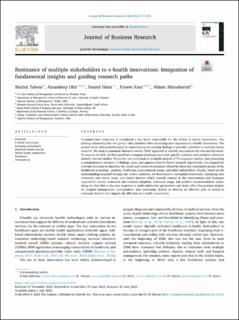Resistance of multiple stakeholders to e-health innovations: Integration of fundamental insights and guiding research paths
Journal article, Peer reviewed
Published version

Åpne
Permanent lenke
https://hdl.handle.net/11250/3108037Utgivelsesdato
2023Metadata
Vis full innførselSamlinger
Sammendrag
Consumer/user resistance is considered a key factor responsible for the failure of digital innovations. Yet, existing scholarship has not given it due attention while examining user responses to e-health innovations. The present study addressed this need by consolidating the existing findings to provide a platform to motivate future research. We used a systematic literature review (SLR) approach to identify and analyze the relevant literature. To execute the SLR, we first specified a stringent search protocol with specific inclusion and exclusion criteria to identify relevant studies. Thereafter, we undertook an in-depth analysis of 72 congruent studies, thus presenting a comprehensive structure of findings, gaps, and opportunities for future research. Specifically, we mapped the relevant literature to elucidate the nature and causes of resistance offered by three key constituent groups of the healthcare ecosystem—patients, healthcare organizational actors, and other stakeholders. Finally, based on the understanding acquired through our critical synthesis, we formulated a conceptual framework, classifying user resistance into micro, meso, and macro barriers which provide context to the interventions and strategies required to counter resistance and motivate adoption, continued usage, and positive recommendation intent. Being the first SLR in the area to present a multi-stakeholder perspective, our study offers fine-grained insights for hospital management, policymakers, and community leaders to develop an effective plan of action to overcome barriers that impede the diffusion of e-health innovations.
